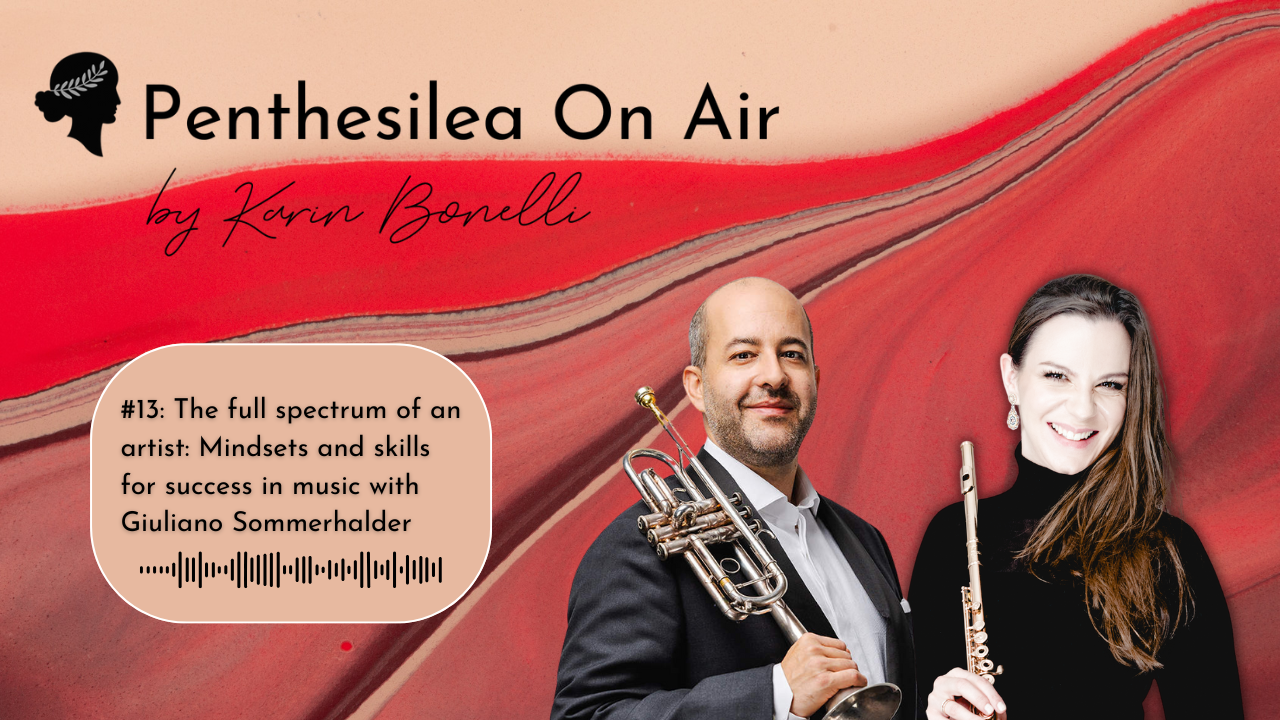A Conversation with Giuliano Sommerhalder: On Virtuosity, Resilience, and the Future of Music
Every time I sit down for a new Penthesilea on Air episode, I’m reminded why I love these conversations so much: they allow me to discover not only try guest’s approaches to their individual artistry, but also the human stories, struggles and visions that shape them. My recent talk with trumpeter Giuliano Sommerhalder was exactly that—an inspiring journey through the highs and lows of a life in music.
Giuliano’s career reads like a dream résumé: former principal trumpet of the Leipzig Gewandhaus Orchestra and the Royal Concertgebouw in Amsterdam, now with the Orchestre de la Suisse Romande in Geneva, plus countless solo and chamber projects, not to mention teaching. But what impressed me most was not the list of accomplishments—it was his openness, his humility, and his desire to rethink what it means to be a musician today.
The Orchestra: A Dream and Its Demands
When Giuliano spoke about the orchestra, I could feel both his love and his realism. He shared how, as a young musician, he dreamed of sitting in the middle of a Mahler or Bruckner symphony, completely surrounded by sound. That dream eventually came true—but it wasn’t always easy.
He recalled a tour in Japan, playing Bruckner’s Fourth, where one stubborn note kept betraying him. The story ended with a fifteen-minute lecture from Riccardo Chailly, and a big lesson learned on how to choose the right material for different situations. Instead of discouraging him, these experiences taught him to search for solutions—to find equipment and approaches that would never let him down.
At the same time, he described the orchestra as a kind of living masterclass. Being surrounded by extraordinary musicians, learning from soloists and conductors every day—it’s this environment, he said, that makes you realize “the real study begins when you get into the orchestra.”
Failure as a Teacher
One of the core topics in our conversation was how to handle the growing amount of recordings students have to deliver to apply to auditions and competitions - much more so since Covid hit the classical world. He warned against obsessing over the “perfect take.” Judges, he reminded us, don’t care about perfection—they care about music: intonation, phrasing, rhythm, style.
What touched me most was his honesty about failure. He admitted that the moments that went wrong often taught him more than the moments that went smoothly. That’s a perspective I share deeply—how often do we grow most in the places where we stumble?
Teaching and Daily Rituals
One great picture he gives his students (and our listeners) was to imagine themselves inside the music, almost like putting on virtual reality glasses during an audition to enter each work of art with a different style and energy. With this image in mind every excerpt in every audition can become a world or whole universe of its own, inviting the jury to see all of your rich facets as a musician.
I also smiled when he confessed that his practice routine is “extremely unstructured.” Instead of rigid schedules, he listens to his body and focuses on sound, resonance, and slow exercises. It was a reminder that discipline doesn’t always mean rigidity—it can also mean tuning in carefully to what we need on a given day.
Looking Forward
One of the most surprising moments was when Giuliano revealed a secret dream: conducting. He spoke passionately about wanting conductors to “breathe with the musicians” and to remain open to feedback. Listening to him, I realized just how much empathy and understanding he brings to every role he takes on.
But even bigger than his conducting dream is his vision of democratizing music education. He spoke about the privilege of having grown up with access to high-level training, and about his desire to make such opportunities available worldwide—especially in regions where talent is abundant but access is scarce.
Gratitude for Music
What stayed with me long after our conversation was Giuliano’s reminder of how lucky we are as musicians. It is so easy to get caught up in fear, doubt, the pressure of comparison or just mere orchestra routine. But at the end of the day, we have chosen to dedicate our lives to something profoundly beautiful.
Our exchange left me with renewed gratitude—for the privilege of making music, for the chance to share it with others, and for conversations like these that remind me why I fell in love with this art form in the first place.
Giuliano Sommerhalder’s journey is not just about the trumpet. It’s about resilience, imagination, and the belief that music belongs to everyone.
🎧 Listen to the full episode here:


